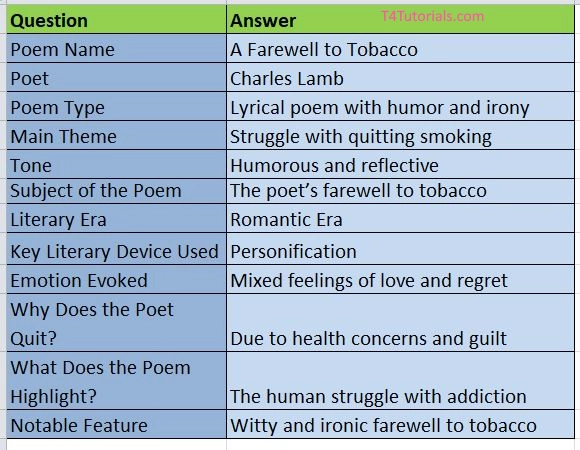Summary:
Charles Lamb’s poem “A Farewell to Tobacco” is a humorous yet reflective piece in which the poet expresses his struggle with quitting tobacco. The poem captures his deep attachment to the habit, portraying tobacco as both a pleasure and a harmful addiction. Lamb personifies tobacco, describing it almost like a friend or a lover that he must part ways with, despite his reluctance.
The poem is written in a mock-serious tone, blending wit, irony, and poetic elegance. Through rich imagery and clever wordplay, Lamb highlights the conflicting emotions of enjoyment and guilt associated with smoking. While he acknowledges its negative effects, he also laments the loss of the comfort it brings him.
In essence, “A Farewell to Tobacco” is both a personal reflection and a humorous critique of human tendencies toward addiction and indulgence.

| Question | Answer |
| Poem Name | A Farewell to Tobacco |
| Poet | Charles Lamb |
| Poem Type | Lyrical poem with humor and irony |
| Main Theme | Struggle with quitting smoking |
| Tone | Humorous and reflective |
| Subject of the Poem | The poet’s farewell to tobacco |
| Literary Era | Romantic Era |
| Key Literary Device Used | Personification |
| Emotion Evoked | Mixed feelings of love and regret |
| Why Does the Poet Quit? | Due to health concerns and guilt |
| What Does the Poem Highlight? | The human struggle with addiction |
| Notable Feature | Witty and ironic farewell to tobacco |
MCQs & Summary of Some Famous Poems by Charles Lamb
- The Old Familiar Faces – MCQs & Summary
- Hester – MCQs & Summary
- A Farewell to Tobacco – MCQs & Summary
- On an Infant Dying as Soon as It Was Born – MCQs & Summary
- The Grandame – MCQs & Summary
- Blindness – MCQs & Summary
- To Margaret W MCQs & Summary
Famous English Authors MCQs
- William Wordsworth MCQs
- William Shakespeare MCQs
- Robert Browning MCQs
- W B Yeats MCQs
- Edmund Spenser MCQs
- Chaucer MCQs
- John Milton MCQs
- S T Coleridge MCQs
- Lord Byron MCQs
- PB Shelley MCQs
- John Dryden MCQs
- John Keats MCQs
- Charles Dicken MCQs
- Alfred Lord Tennyson MCQs
- Charles Lamb MCQs
- D.H Lawrence MCQs
- Thomas Hardy MCQs
- Matthew Arnold MCQs
- John Galsworthy MCQs
- George Bernard Shaw MCQs
- T.S Eliot MCQs
- Ben Jonson MCQs
- Francis Bacon MCQs
- Alexander Pope MCQs
- Oliver Goldsmith MCQs
- Joseph Addison MCQs
- Dr Samuel Johnson MCQs
- Henry Fielding MCQs
- Sir Walter Scott MCQs
- Jane Austen MCQs
- Dr. Samuel Johnson MCQs
- English Comedy MCQs (Oliver Goldsmith)
- Alexander Pope MCQs (Neo-Classical Age of English Poetry)
- Daniel Defoe MCQs
- Dr. Jonathan Swift MCQs
- Richard Steele MCQs
- English Drama MCQs
- Elizabethan Drama MCQs [14th to 17th century]
- Elizabethan Prose MCQs
More English Literature MCQs
- English Poetry MCQs
- History of English Literature MCQs
- Sentimental Novels MCQs
- Sentimental Poetry MCQs
- Legends Of English Literature MCQs
- English Literature Quiz
- English Literature Important Multiple Choice Questions Answers
- Sons And Lovers by D H Lawrence MCQs
- The Waste Land, A Poem by T. S. Eliot MCQs
- Drama Origin MCQs
- History of the Renaissance Period MCQs
- English Pros MCQs
- Non-Dramtic Poets Of The Elizabethan Age MCQs
- The Cavalier Poets of 17th-century MCQs
- Metaphysical Poets of 17th century MCQs
- Renaissance Period of 14th, 15th, and 16th centuries MCQs
- Puritan Poet MCQs
- Restoration Comedy by William Congreve & Wycherley MCQs
- Satire MCQs – Renaissance Period by John Dryden
- English Essayists MCQs
- Romantic Period of Romantic Poets MCQs
- English language MCQs
- English Humour MCQs [American Literature]
- Early Writers of American Literature MCQs
- History of American Literature MCQs
- American Prose MCQs [English Realism ]
- American English Critics
- New Englanders Authors MCQs
- MCQs on American Literature After Independence
- American Playwrights MCQs
- New American Poetry MCQs
- British English Critics MCQs
- Ancient English literature MCQs
- Important English Literature MCQs for Public Service Commission
- English Literature Repeated Important MCQs
- CSS English Literature MCQs
- History of Early Period MCQs
- The Anglo-Saxon period MCQs
- The Age of Chaucer in the Early Period MCQs
- The Anglo-Norman Period of French Writers MCQs
- Metrical Romances MCQ (Anglo-Saxon Period)
- Revival of Learning MCQs (1400-1550)
- Applied Linguistics MCQs
- Language Change MCQs